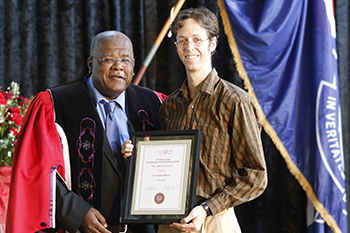Latest News Archive
Please select Category, Year, and then Month to display items
18 September 2018
Photo Hanno Otto
 The OSM Camerata is once again a winner, sharing the first prize in the Ictus International Music Competition with the Oklahoma State University.
The OSM Camerata is once again a winner, sharing the first prize in the Ictus International Music Competition with the Oklahoma State University.
If Einstein’s string theory had a musical undertone, one would think it is because of the sweet melodies of the Odeion School of Music Cameratas’ (OSMC) violins and cellos. It should therefore come as no surprise that OSMC won the 2018 International Ictus Music Competition, again. The ensemble has been paving the way to numerous successes since its inception in 2012.
This year, however, the OSMC is sharing the first prize with the Oklahoma State University Symphony Orchestra, under the direction of Dr Thomas Dickey. The OSMC’s competition recital for 2018 was conducted by principle conductor, Xavier Cloete. Acclaimed violist Elsabé Raath, joined the OSMC artistic team in 2017 as string clinician.
OSMC the jewel in crown
The OSMC is based at the Odeion School of Music (OSM) at the University of the Free State UFS) and was strategically founded as the OSM’s flagship ensemble with the main objective, creating a catalyst for excellence. “From a pedagogical perspective, it serves as a feasible incubator to nurture fully-rounded musicians who are thoroughly prepared for the demands of their trade as orchestral musicians, soloists and conductors,” said Marius Coetzee founder of the OSMC.
“Ms Raath also made her debut as conductor during the 2018 Ictus Music Competition where she conducted O Sacrum Convivium by Olivier Messiaen,” said Coetzee, founder of the OSMC. Elsabé was also conductor during the 2018 Ictus Music competition.
The OSMC’s concert programme for Ictus 2018 also consisted of works by Jacobus Gallus/Lance Phillip, Béla Bartók, Peteris Vasks/Keith Moss, as well as Johann Sebastian Bach.
Ictus an ideal platform
The Ictus International Music Competition is an online music competition for wind bands, orchestras and solo trumpet. It has been described by David Bilger of the Philadelphia Orchestra as “democratising music competitions”. Ictus was founded to make international music competitions more accessible though eliminating prohibitive travel costs, conference fees and visa issues. This was made possible through having the application and adjudication take place online only.
You can listen to OMSC Ictus submissions here:
Duo Seraphim Jabobus Gallus/Lance Phillip
Romanian Folk Dances/ Román népi táncok Béla Bartók
Kekatu Dziesma (Carnival Song) Peteris Vasks/Keith Moss
Book Prize for Distinguished Scholarship awarded to Dr Christian Williams
2016-03-24

Prof Jonathan Jansen, Vice-Chancellor and Rector of the University of the Free State and Dr Christian Williams, senior lecturer at the UFS Department of Anthropology.
Photo: Johan Roux |
When Dr Christian Williams moved from the United States to Namibia in January 2000 as part of the WorldTeach volunteer programme for teachers, he had not anticipated an award-winning piece of scholarship in his future. It was during these visits to Namibia, though, that the seeds for his highly-acclaimed book were sewn.
While volunteering at the St. Therese Secondary School in Tses at that time, Dr Williams – now a senior lecturer at the University of the Free State (UFS) Department of Anthropology – became acquainted with some of the school’s alumni. The stories these individuals started sharing with him soon revealed personal histories of exile and violence by fellow SWAPO (South West Africa People’s Organization) members.
These experiences ultimately resulted in Dr Williams’ book, National liberation in postcolonial southern Africa: a historical ethnography of SWAPO’s exile camps, published last year. Due to the book’s literary impact, the university awarded Dr Williams the UFS Book Prize for Distinguished Scholarship on Friday 19 February 2016. Dr Williams is the second academic to be awarded this prize.
Politics of the past
In the 1960s, Namibians mobilised and retaliated against colonial rule under the liberation movement known as SWAPO. This created political tension which resulted in the flight of many SWAPO members to exile camps administered by the party.
“Over its three decades in exile, SWAPO was responsible for the welfare of roughly 60 000 Namibians. This was about 4% of the total Namibian population at independence – most of whom lived in camps,” says Dr Williams. The research originally used as a basis for his doctoral thesis was subsequently developed into this prize-winning book.
Advancing the Human Project
“It’s an honour to receive recognition from the university; it means that they value the kind of work that I am doing. I think it’s great for universities to have such prizes,” Dr Williams says.
Supporting the UFS Human Project, Dr Williams will donate a portion of the R25 000 prize money towards the UFS Student Bursary Fund Campaign, as well as the school in Namibia.The rest will subsidise the purchase of the book for distribution to libraries and as gifts.